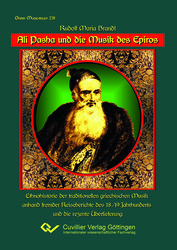| Departments | |
|---|---|
| Book Series (97) |
1382
|
| Nachhaltigkeit |
3
|
| Gesundheitswesen |
1
|
| Humanities |
2372
|
| Medienwissenschaften | 16 |
| Theology | 57 |
| Philosophy | 102 |
| Law | 423 |
| Economics | 853 |
| Social sciences | 417 |
| Sports science | 48 |
| Psychology | 233 |
| Educational science | 190 |
| History | 183 |
| Art | 111 |
| Cultural studies | 166 |
| Literary studies | 117 |
| Linguistics | 89 |
| Natural Sciences |
5408
|
| Engineering |
1798
|
| Common |
98
|
|
Leitlinien Unfallchirurgie
5. Auflage bestellen |
|
Advanced Search
Ali Pasha und die Musik des Epiros (Volume 231) (English shop)
Ethnohistorie der traditionellen griechischen Musik anhand fremder Reiseberichte des 18./19.Jahrhunderts und die rezente Überlieferung
Rudolf M. Brandl (Author)Preview
Extract, PDF (510 KB)
Table of Contents, PDF (170 KB)
The Albanian Vezir Ali Pasha Tepeleni was a famous Pasha and warlord between 1798-1821 of the Ottoman Empire, whose cultural activities influenced the traditional Greek and Albanian music of mainland Greeece till today. Many foreign travellers visited his court in Janina/Ioannina, capital of Epiros (Northern Greece), where a synthesis of South- European and Fanariot urban music mixed with Greek, Aromun (Vlach) and South- Albanian folk music was performed by Jewish and Roma musicians. This urban music has a genuin Greek „kommati”-structure of fractal dimensions (similary with the „skopos” structure of the Greek Islands), which is verified by comparative analyses, recorded during a long term ethnomusicological fieldresearch since 1977 by Rudolf and Daniela Brandl and Bernhard Graf and archived in the „R.M. Brandl Collection” in the Phonogrammarchiv of the Austrian Academy of Sciences in Vienna and published in the „Orbis Musicarum” series in the Cuvillier Verlag on DVD. An important source is the Heritage Manuscript of the Epirotic master musician in the 5 th generation, Grigoris Kapsalis. It was recorded according to emic aesthetics and contained 60 Kleftic ballads, Ioanniotika and Alipashalitika from only one professional musicians family repertoire.
| ISBN-13 (Hard Copy) | 9783736994843 |
| ISBN-13 (eBook) | 9783736984844 |
| Final Book Format | B5 |
| Language | German |
| Page Number | 572 |
| Lamination of Cover | glossy |
| Edition | 1. + 2 DVD's |
| Book Series | Orbis Musicarum |
| Volume | 231 |
| Publication Place | Göttingen |
| Publication Date | 2017-02-24 |
| General Categorization | Non-Fiction |
| Departments |
Sociology
Modern history Local and regional history Musicology Slavistic and Byzantine studies (including Modern Greek) Ethnology |
| Keywords | Ali Pasha Tepelini, traditional Greek and Albanian music, janina/Ioannina, synthesis of South-European and Fanariot urban music, folk music, Jewish musicians, Roma musicians, skopos, ethnomusicological fieldresearch, R.M. Brandl Collection, Orbis Musicarum, Epirotic master musician, Grigoris Kapsalis, emic aesthetics, kleftic ballads, Ioanniotika, Alipashalitika, Volksmusik Griechenland, Epiros, Koumpaneia, Klarinettenensemble, Räuberballaden, Ali Pasha, Ioannina |








